The Economics and Statistics Division maintains archives of previous publications for accountability purposes, but makes no updates to keep these documents current with the latest data revisions from Statistics Canada. As a result, information in older documents may not be accurate. Please exercise caution when referring to older documents. For the latest information and historical data, please contact the individual listed to the right.
<--- Return to Archive
For additional information relating to this article, please contact:
March 17, 2021NEW BRUNSWICK BUDGET 2021-22 The government of New Brunswick has released its 2021-22 Budget, anticipating a surplus of $245 million for 2021-22 and ongoing deficits in each of the next two fiscal years. Revenues are projected to rise by 1.2% in 2021-22 followed by increases averaging 0.9% over the next two fiscal years. Expenditures are estimated to grow by 3.4% in 2021-22, followed by annual average gains of 0.7% over the next two fiscal years.
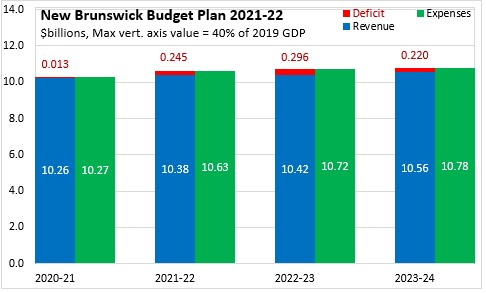
New Brunswick's 2020-21 fiscal plan was announced just prior to the global pandemic with an outlook for modest increases in revenues and expenditures. Despite the pandemic, New Brunswick has needed fewer restrictions and control measures, keeping the deficit in 2020-21 to a modest $12.7 million. Going forward, the New Brunswick government now projects higher expenditures as well as slower growth in revenues - contributing to deficits in each of the next three fiscal years.
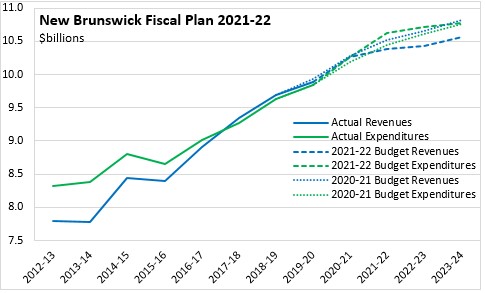
Prior to the pandemic, New Brunswick had been anticipating small surpluses in each fiscal year. With rising expenditures following the pandemic, the revised fiscal plan projects deficits in each of the next three fiscal years.
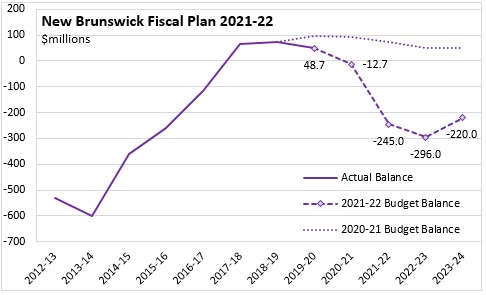
New Brunswick's projected deficits amount to less than 1% of GDP in each of the next three fiscal years. The New Brunswick government's footprint in the economy (measured as a share of GDP) is projected decline from just under 30% to 28.5% by 2023-24.
After rising to 37.3% of GDP in 2020-21, New Brunswick's debt to GDP ratio is projected to fall to 35.4% by 2023-24.
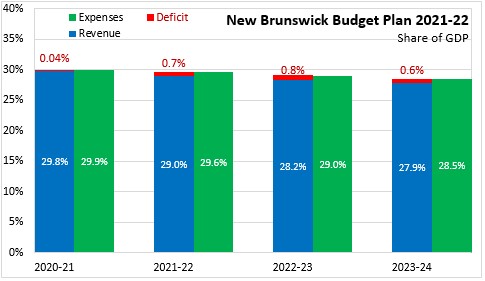
The impact of COVID-19 on the New Brunswick economy has been more modest than in other provinces, where the outbreaks were more widespread. Real GDP is estimated to have declined by 3.9% in 2020. Growth is expected to return at a pace of 2.9% in 2021, though there remains uncertainty around the speed of both vaccine rollout as well as spread of COVID-19 variants. In the coming months, employment, wages and household expenditures are projected to grow again. However, recovery in investment and tourism activity is expected to be slower.
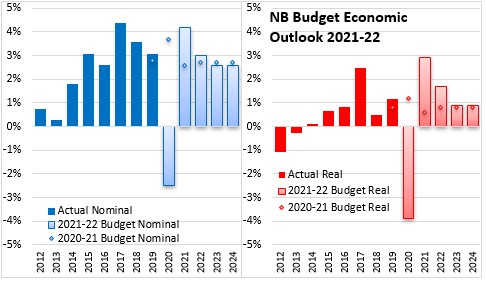
Key Measures and Initiatives
The New Brunswick Budget for 2020-21 prioritizes:
- Rollout of vaccines and ongoing contact tracing efforts
- Increased resources for health care, including mental health resources, nurse practitioners, physician recruitment and home support workers
- Technological supports for more distance learning
- Economic renewal through broadband infrastructure, small modular nuclear reactors, spruce budworm control and continuation of the travel incentive program
- Support to communities through crime reduction and continuing investments with the National Housing Strategy
- Increasing the tax on carbon-emitting products to $40 as required by the Federal backstop and transferring $36 million to the Climate Change Fund
New Brunswick Budget 2021-22
<--- Return to Archive